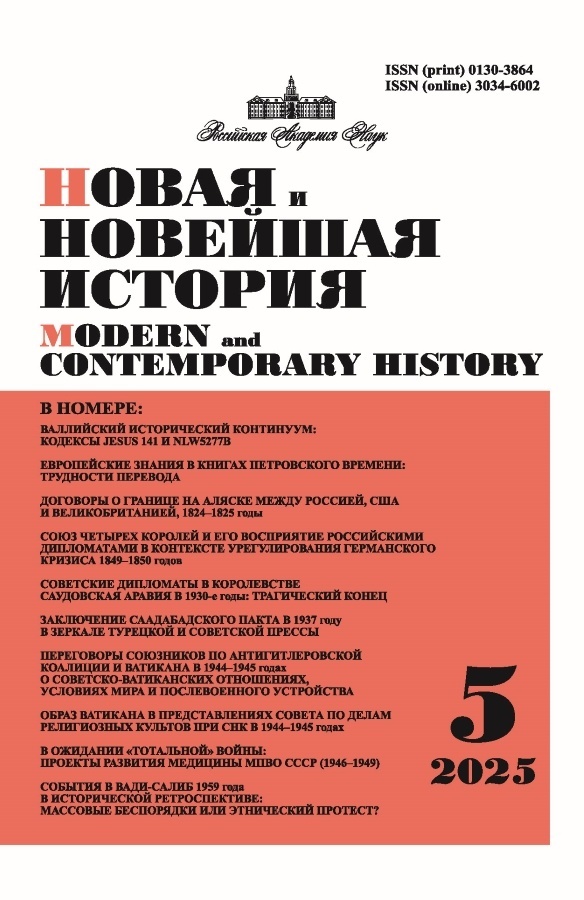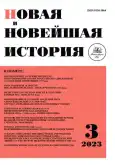Russia in War for Foreign Interests: Negotiations Between British and Rus-sian Diplomats on the Subsidy Conventions of 1747
- Authors: Labutina T.L.1
-
Affiliations:
- Institute of World History, RAS
- Issue: No 3 (2023)
- Pages: 54-66
- Section: Modern history
- URL: https://rjsvd.com/0130-3864/article/view/671008
- DOI: https://doi.org/10.31857/S013038640025910-9
- ID: 671008
Cite item
Abstract
In 1740–1748, the War of the Austrian Succession took place in Europe, which involved France, Britain, Prussia, Austria and a number of other countries seeking to conquer territories both within and outside Europe. In 1748 Russia, which had no such objectives, also entered the war. In fact, Russia had been drawn into the war by Great Britain through the signing of the three Subsidy Conventions of 1747. This involved the use of a Russian military corps by the British in return for the payment of monetary subsidies. The British Ambassador Extraordinary and Plenipotentiary, John Carmichael, 3rd Earl of Hyndford, was a witness to these events and also one of the principal negotiators of the conventions. Drawing on reports from the Ambassador to the Russian court to the British Secretary of State, the author provides the first detailed analysis of the negotiation process, showing its inner workings through the diplomat's reports, which allows one to determine which position each side took and what goals they were pursuing. Attention is drawn to the complex nature of the negotiations and the difficulties that diplomats on both sides had to face in negotiating a number of issues, including the manner and amount of subsidies, the choice of commanders, the cost of food and medical treatment for troops from the Russian corps, etc. This issue is addressed for the first time in historical scholarship. As analysis of both Hyndford's reports and the Secretary of State's dispatches demonstrates, persistence in pursuing objectives, the pursuit of one's own interests alone, firmness of position, as well as blackmail and bribery, were all used by British diplomacy in the negotiation process. In turn, the Russian govern-ment, represented by Empress Elizabeth Petrovna and Chancellor Alexey Bestuzhev-Rumin, persistently and consistently defended the interests of the Russian Empire. Through the subsidy conventions, which provided support for Britain and the Netherlands, the War of the Austrian Succession soon came to an end, but as a result Russia was not among the beneficiaries.
About the authors
Tatyana Leonidovna Labutina
Institute of World History, RASRussian Federation, Moscow
References
- Алексеева М.Н. Английская дипломатия в годы войны за австрийское наследство 1740–1748 гг.: дис. … канд. ист. наук. Брянск, 2005.
- Анисимов М.Ю. Россия в системе великих держав в царствование Елизаветы Петровны. 1741–1761 гг. М., 2020.
- Военные конфликты, кампании и боевые действия русских войск 860–1914 гг. // www. runivers.ru… v_voyne_za_avstriyskoe_nasledstvo…gg (дата обращения: 09.12.2022).
- Донесения и другие бумаги английских послов, посланников и резидентов при русском дворе с 4 января 1746 г. по 24 мая 1748 г. // Сборник императорского русского исторического общества. Т. 102. СПб., 1898.
- История внешней политики России. XVIII век (От Северной войны до войны России против Наполеона). М., 1998.
- Лабутина Т.Л. Стратегия и тактика британской дипломатии на переговорах о союзном договоре с Россией 1741 г. // ЛОКУС: люди, общество, культуры, смыслы. 2021. Т. 12. № 2. С. 51–65.
- Медведев Ю.С. Русско-английские отношения в середине XVIII века: дис. … канд. ист. наук. М., 2004.
- Собко Е.М. Россия и война за Австрийское наследство. 1740–1750. М., 2021.
- Яковлев Н.Н. Европа накануне Семилетней войны. М., 2000.
- Anderson M.S. The War of the Austrian Succession. 1740–1748. London; New York, 1995.
- Reed B. The War of the Austrian Succession. New York, 1994.
Supplementary files











